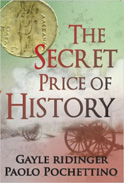
 |
The Secret Price of History: Searching for the Treasure behind Alexander's Medallion
by Gayle Ridinger and Paolo Pochettino
Dante University Press
Alexander the Great's army conquered a vast amount of territory in a short amount of time, and in the process the young Macedonian general amassed for himself a great deal of treasure. Although much of the riches have been discovered, what if there existed objects that could point to a hidden trove of his fabulous wealth? To locate it, how many people would the unscrupulous be willing to torture and murder? This idea is central to the authors' tale, and if that was all there was to the novel, then it could easily be lumped in with countless other thrillers that employ similar plot lines. But what sets this particular work apart is the well-researched and poignant subplot set in the middle of the nineteenth century, a storyline that catapults the book from the ranks of genre fiction into literature.
Goffredo and Sandor come from very different backgrounds, but their dreams of a better world free from the tyranny that has plagued Europe in the past propel them into the fight to unify Italy under one banner. Under the command of Giuseppe Garibaldi during the 1849 siege of Rome, the two companions manage to thwart a trio of Frenchmen who have killed a priest in a church their forces have bombed to gain an ancient medallion and two other mysterious objects. Saying their goodbyes to Eleonora, the woman they both love, on the banks of the Tiber before retreating from the city, little do they know how important and perilous the artifacts they have divided among the three of them will be in the future. Riveting, superbly paced, and rich with both American and European history, this book deftly blends romance with suspense and fiction with fact to create a truly enjoyable reading experience. It is not to be missed.
RECOMMENDED by the US Review